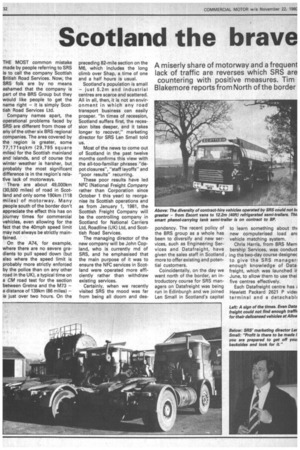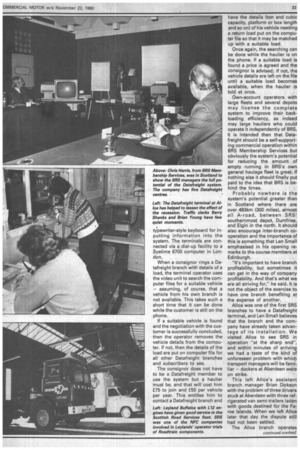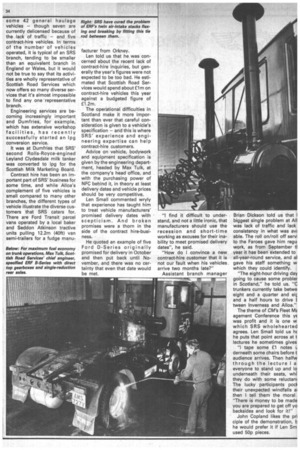Scotland the brave
Page 34

Page 35

Page 36

If you've noticed an error in this article please click here to report it so we can fix it.
A miserly share of motorway and a frequent lack of traffic are reverses which SRS are countering with positive measures. Tim Blakemore reports from North of the border
THE MOST common mistake made by people referring to SRS is to call the company Scottish British Road Services. Now, the SRS folk are by no means ashamed that the company is part of the BRS Group but they would like people to get the name right — it is simply Scottish Road Services Ltd.
Company names apart, the operational problems faced by SRS are different from those of any of the other six BRS regional companies. The area covered by the region is greater, some 77,171sqkm (29,795 square miles) for the Scottish mainland and islands, and of course the winter weather is harsher, but probably the most significant difference is in the region's relative lack of motorways.
There are about 49,000km (30,500 miles) of road in Scotland and only some 190km (118 miles) of motorway. Many people south of the border don't appreciate the effect this has on journey times for commercial vehicles, even allowing for the fact that the 40mph speed limit may not always be strictly maintained.
On the A74, for example, where there are no severe gradients to pull speed down (but also where the speed limit is probably more strictly enforced by the police than on any other road in the UK), a typical time on a CM road test for the section between Gretna and the M73 — a distance of 139km (86 miles) — is just over two hours. On the preceding 82-mile section on the M6, which includes the long climb over Shap, a time of one and a half hours is usual.
Scotland's population is small — just 5.2m and industrial centres are scarce and scattered. All in all, then, it is not an environment in which any road transport business can easily prosper. "In times of recession, Scotland suffers first, the recession bites deeper, and it takes longer to recover," marketing director for SRS Len Small told us.
Most of the news to come out of Scotland in the past twelve months confirms this view with the all-too-familiar phrases "depot closures", "staff layoffs" and "poor results" recurring.
These poor results have led NFC (National Freight Company rather than Corporation since October 1 this year) to reorganise its Scottish operations and as from January 1, 1981, the Scottish Freight Company will be the controlling company in Scotland for National Carriers Ltd, Roadline (UK) Ltd, and Scottish Road Services.
The managing director of the new company will be John Copland, who is currently md of SRS, and he emphasised that the main purpose of it was to ensure the NFC services in Scotland were operated more efficiently rather than withdraw existing services.
Certainly, when we recently visited SRS the mood was far from being all doom and des
pondency. The recent policy of the BRS group as a whole has been to diversify and new services, such as Engineering Services and Datafreight, have given the sales staff in Scotland more to offer existing and potential customers.
Coincidentally, on the day we went north of the border, an introductory course for SRS managers on Datafreight was being run in Edinburgh and we joined Len Small in Scotland's capital to learn something about thf new computerised load an vehicle matching system.
Chris Harris, from BRS Mem bership Services, was conduct ing the two-day course designec to give the SRS manager: enough knowledge of Data freight, which was launched ir June, to allow them to use thei five centres effectively.
Each Datafreight centre has Hewlett Packard 2621 P videc terminal and a detachablE
typewriter-style keyboard for in
information into the system. The terminals are connected via a dial-up facility to a Systime 6700 computer in London.
When a consignor rings a Datafreight branch with details of a load, the terminal operator uses the video unit to search the computer files for a suitable vehicle — assuming, of course, that a vehicle from his own branch is not available. This takes such a short time that it can be done while the customer is still on the phone.
If a suitable vehicle is found and the negotiation with the customer is successfully concluded, then the operator removes the vehicle details from the computer. If not, then the details of the load are put on computer file for all other Datafreight branches and subscribers to see.
The consignor does not have to be a Datafreight member to use the system but a haulier must be, and that will cost him 05 to join and £50 per vehicle per year. This entitles him to contact a Datafreight branch and Left: Leyland Buffalos with L72 engines have given good service in the Scottish Road Services fleet. SRS was one of the NFC companies involved in Leylands' operator trials of Roadtrain components. have the details (ton and cubic capacity, platform or box length and so on) of his vehicle needing a return load put on the compu ter file so that it may be matched up with a suitable load.
Once again, the searching can be done while the haulier is on the phone. If a suitable load is found a price is agreed and the consignor is advised; if not, the vehicle details are left on the file until a suitable load becomes available, when the haulier is told at once.
Own-account operators with large fleets and several depots may license the complete system to improve their backloading efficiency, as indeed may large hauliers who could operate it independently of BRS. It is intended then that Data freight should be a self-support ing commercial operation within BRS Membership Services but obviously the system's potential for reducing the amount of empty running in BRS's own general haulage fleet is great. If nothing else it should finally put paid to the idea that BRS is behind the times.
Probably nowhere is the system's potential greater than in Scotland where there are over 483km (300 miles), almost all A-road, between SRS' southernmost depot, Dumfries, and Elgin in the north. It should also encourage inter-branch co operation and the importance of this is something that Len Small emphasised in his opening remarks to the course members at Edinburgh.
"It's important to have branch profitability, but sometimes it can get in the way of company profitability. And that's what we are all striving for," he said. It is not the object of the exercise to have one branch benefiting at the expense of another.
Alloa was one of the first SRS branches to have a Datafreight terminal, and Len Small believes that the branch and the company have already taken advantage of its installation. We visited Alloa to see SRS in operation "at the sharp end", and within minutes of arriving we had a taste of the kind of unforeseen problem with which transport managers will be familiar — dockers at Aberdeen were on strike.
This left Alloa's assistant branch manager Brian Dickson with the problem of three drivers stuck at Aberdeen with three refrigerated van semi-trailers laden with goods destined for the Faroe Islands. When we left Alloa later that day the dispute still had not been settled.
The Alloa branch operates some 42 general haulage vehicles — though seven are currently delicensed because of the lack of traffic — and five contract-hire vehicles. In terms of the number of vehicles operated, it is typical of an SRS branch, tending to be smaller than an equivalent branch in England or Wales, but it would not be true to say that its activities are wholly representative of Scottish Road Services which now offers so many diverse services that it's almost impossible to find any one representative branch.
Engineering services are becoming increasingly important and Dumfries, for example, which has extensive workshop facilities, has recently successfully started an lpg conversion service.
It was at Dumfries that SRS' second Rolls-Royce-engined Leyland Clydesdale milk tanker was converted to lpg for the Scottish Milk Marketing Board.
Contract hire has been an important part of SRS' business for some time, and while Alloa's complement of five vehicles is small compared to many other branches, the different types of vehicle illustrate the diverse customers that SRS caters for. There are Ford Transit parcel vans operated by a local baker and Seddon Atkinson tractive units pulling 12.2m (40ft) van semi-trailers for a fudge menu facturer from Orkney.
Len told us that he was concerned about the recent lack of contract-hire inquiries, but generally the year's figures were not expected to be too bad. He estimated that Scottish Road Services would spend about £1 m on contract-hire vehicles this year against a budgeted figure of £1.2m.
The operational difficulties in Scotland make it more important than ever that careful consideration is given to a vehicle's specification — and this is where SRS' experience and engineering expertise can help contract-hire customers.
Advice on vehicle, bodywork and equipment specification is given by the engineering department, headed by Max Tulk, at the company's head office, and with the purchasing power of NFC behind it, in theory at least delivery dates and vehicle prices should be very competitive.
Len Small commented wryly that experience has taught him to treat vehicle manufacturers' promised delivery dates with scepticism. And broken promises were a thorn in the side of the contract hire-business.
He quoted an example of five Ford D-Series originally promised for delivery in October and then put back until November, and there was no certainty that even that date would be met. "I find it difficult to understand, and not a little ironic, that manufacturers should use the recession and short-time working as excuses for their inability to meet promised delivery dates", he said.
"How do I convince a new contract-hire customer that it is not our fault when his vehicles, arrive two months late?"
Assistant branch manager Brian Dickson told us that I biggest single problem at All was lack of traffic and lack consistency in what was avr able. The roll on/roll off servi to the Faroes gave him regu work, as from September tl year it has been extended to all-year-round service, and al gave his staff something w which they could identify.
"The eight-hour driving day going to cause some probler in Scotland," he told us. "C trunkers currently take betwe eight and a quarter and eic and a half hours to drive t tween Inverness and Alloa."
The theme of CM'S Fleet Me agement Conference this ye was profit and it is one w which SRS wholehearted agrees. Len Small told us hc he puts that point across at t lectures he sometimes gives
"1 tape some El notes L derneath some chairs before t audience arrives. Then halfw through the lecture I a everyone to stand up and lo underneath their seats, whi they do with some reluctan( The lucky participants pod, their unexpected windfalls al then I tell them the moral "There is money to be made you are prepared to get off yo backsides and look for it!"
John Copland likes the pri ciple of the demonstration, h he would prefer it if Len Sm used 50p pieces.














































































































